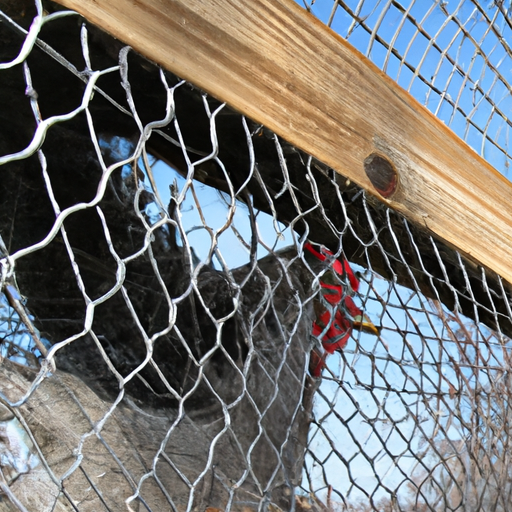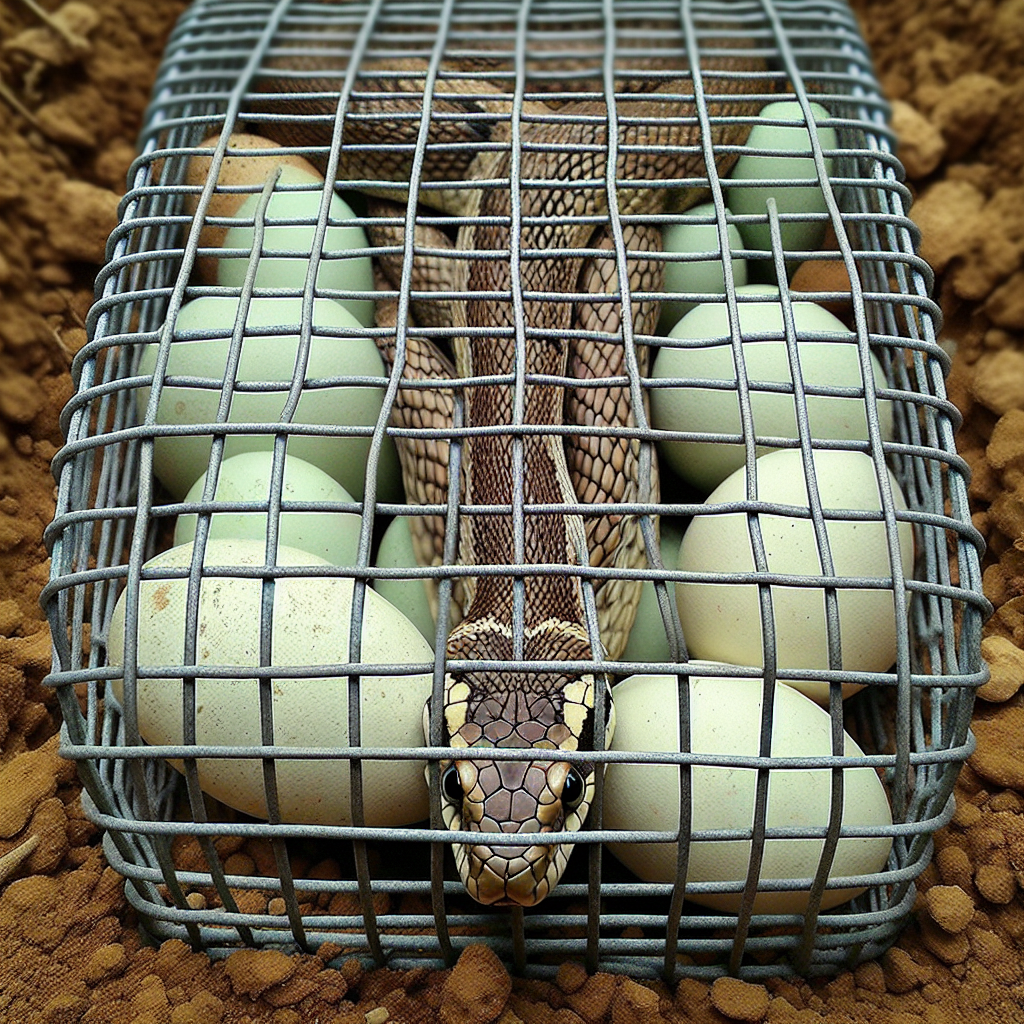If you’re a chicken owner and want to ensure the safety of your beloved flock, it’s essential to take precautions against potential predators. One common concern is how to secure the chicken coop outdoor run to prevent digging or climbing predators. Knowing the right steps to take will not only help protect your chickens but also give you peace of mind. In this article, we’ll explore some effective methods to safeguard your chicken coop and keep those sneaky invaders at bay.
Secure Fencing
Keeping your chicken coop and outdoor run secure is essential to protect your feathered friends from potential predators. One of the first steps you can take to ensure their safety is to use sturdy materials for your fencing. Opt for strong and durable materials like metal or thick wood that can withstand any attempts to breach the enclosure.
To further fortify your fencing, consider burying it underground. Dig a trench around the perimeter of the run and bury a portion of the fencing, ensuring that it extends at least a foot beneath the ground. This will make it difficult for predators such as foxes, raccoons, or dogs to dig their way into the coop.
In addition to burying the fencing, it’s essential to extend it above ground to prevent any attempts at climbing. Ideally, the fencing should be at least six feet tall, making it challenging for larger predators to scale the barrier. Be sure to secure the top of the fencing tightly to prevent any potential gaps or weak spots.
To provide an extra layer of protection against diggers, installing an apron around the perimeter of the run is highly recommended. An apron is a strip of fencing that extends horizontally from the base of the fence, lying flat on the ground. Bury the apron a few inches beneath the soil, forming a barrier that makes it difficult for predators to dig underneath the run. This simple addition can effectively deter persistent burrowers.
Predator-Proof Roof
While securing the walls of the coop is essential, don’t overlook the importance of a predator-proof roof. Predators such as raccoons, owls, or even cats will attempt to gain access from above if given the opportunity. To prevent this, it’s crucial to use durable roofing materials that are resistant to any attempts at breaking in.
Choose roofing materials that are sturdy and difficult to penetrate, such as metal or heavy-duty shingles. Ensure that the edges and corners of the roof are well-secured to prevent any potential gaps. Predators are often adept at finding weak spots, so reinforcing these areas will make it significantly more challenging for them to gain entry.
Covering the roof with wire mesh or hardware cloth adds an extra layer of security. Attach the mesh or cloth securely to the roof, ensuring that there are no gaps or loose sections. This will prevent predators from tearing or clawing their way through the roofing material, effectively keeping them out.
Anti-Digging Measures
Predators have a knack for digging, and it’s crucial to implement anti-digging measures to protect your chickens. Installing an apron around the perimeter of the run, as mentioned earlier, is an effective method to deter burrowers. However, there are additional steps you can take to make digging nearly impossible for predators.
Consider placing hardware cloth beneath the soil in the run area. This prevents predators from digging through the ground by creating a barrier that they cannot easily penetrate. Ensure that the hardware cloth extends at least a foot beneath the soil to provide adequate protection.
Another option is to use gravel or stones in the chicken run. Predators dislike digging through these materials, making it less likely for them to attempt to enter the coop. Spread a layer of gravel or stones over the entire run area, focusing on vulnerable spots or areas where you suspect predators may try to access.
For extra security, you can also place chicken wire over vulnerable areas within the run. This acts as an additional deterrent, making it more challenging for predators to dig underneath the fencing. Remember to secure the wire firmly to prevent any potential gaps or weak points.
Wire Mesh or Hardware Cloth
Choosing the right type of wire mesh or hardware cloth is crucial for an effective predator-proof enclosure. The appropriate gauge of wire is essential to ensure it can withstand any potential attempts at entry. Opt for a heavy-duty gauge that is thick enough to prevent predators from damaging or breaking through the fencing.
Equally important is ensuring that the openings in the wire mesh or hardware cloth are small enough to prevent predators from squeezing through. While the exact size will depend on the type of predators in your area, a good rule of thumb is to choose options with openings no larger than 1 inch in diameter.
Securing the wire tightly to the frame of the coop or run is vital. Any loose or weak sections can provide an opportunity for predators to exploit. Regularly inspect the wire mesh or hardware cloth for signs of damage or wear, and promptly repair or replace any compromised areas.
Monitoring the wire for any signs of damage is essential to maintain the security of your chicken coop. Check for any holes, tears, or loose sections regularly, and ensure that predators cannot gain access through compromised areas. Taking these precautions will help ensure the continued safety of your flock.
Electric Fencing
Electric fencing can be an effective tool in deterring predators from attempting to breach your chicken coop and run. By installing an electric fence system, you can create a powerful deterrent that discourages predators from getting too close to your flock.
When setting up electric fencing, it’s important to place wires at different heights to prevent predators from easily bypassing the system. Start by positioning a wire at around 6-8 inches above the ground, followed by additional wires at intervals of 12-18 inches. This multi-level approach makes it more challenging for predators to find a suitable entry point.
Using warning signs is crucial when employing an electric fence system. These signs not only alert potential trespassers to the presence of an energized fence but can also serve as a reminder for those tending to the chickens. Place signs at regular intervals around the perimeter of the run to ensure maximum visibility.
Proper grounding is vital for the effectiveness of an electric fence system. Ensure that your system is connected to a reliable grounding source, such as a metal rod driven into the ground. This will complete the circuit and deliver a strong, consistent deterrent to any predators that come into contact with the fence.
Predator Deterrents
While securing your coop and run is essential, incorporating additional predator deterrents can further enhance the safety of your chickens. Consider implementing the following measures to discourage predators from targeting your flock:
Motion-Activated Lights
Installing motion-activated lights near the coop or run can startle potential predators and deter them from approaching. Choose lights with a wide coverage area and adjustable sensitivity to ensure that any movement near your chickens’ living area triggers the lights.
Watchdogs or Guard Animals
Consider adding a well-trained guard dog or other suitable guard animals to your flock. These animals can help ward off potential predators and provide an extra layer of protection. However, be cautious in selecting a guardian animal and ensure they are compatible with your chickens and have been properly trained.
Ultrasonic Repellents
Ultrasonic repellents emit high-frequency sounds that are unpleasant to predators, but often undetectable by humans. These devices can help keep predatory animals at bay without causing harm. Place them strategically around the coop and run to create a deterrent effect.
Predator Decoys
Using predator decoys, such as life-sized replicas of owls, hawks, or other natural predators, can fool potential threats into thinking there is already a dominant predator in the area. This can deter predators from attempting to approach your chickens. Remember to move the decoys periodically to maintain their effectiveness.
Secure Entry Points
To ensure the utmost security for your chickens, it’s important to focus not only on the coop itself but also on reinforcing the entry points. Implementing the following measures can significantly reduce the risk of predators gaining access to your flock:
Reinforce doors and windows: Check that all doors and windows are sturdy and free from any weak points. Repair any damage and reinforce them with additional locks or latches if necessary.
Use sturdy locks or latches: Invest in high-quality locks or latches that are designed to withstand tampering or forced entry. Ensure that they are properly installed and regularly inspected for any signs of wear or damage.
Install predator-proof hardware cloth: Attach hardware cloth securely to any windows or vents in the coop. This prevents predators from squeezing through small openings and gaining access to your flock.
Implement automatic door openers: Installing automatic door openers eliminates the need for manual opening and closing, ensuring that your chickens are safely locked inside the coop at night. These openers can be programmed to close the door automatically at dusk and reopen it at dawn, providing an extra layer of security.
Vegetation Management
Maintaining proper vegetation management around your chicken coop is essential for preventing potential predator hiding spots and reducing the risk of intrusions. Consider the following steps to ensure a predator-resistant environment:
Clear bushes and shrubs around the coop: Remove any dense vegetation or shrubbery close to the coop, as these provide cover for predators to hide and potentially gain access to your chickens.
Trim overhanging branches: Trim any branches that hang over the coop or run area. This prevents predators, such as raccoons or owls, from using them as launching points to access your flock.
Remove tall grass or weeds: Regularly mow and maintain the grass or weeds around the coop. Not only does this improve visibility, but it also reduces hiding spots for potential predators.
Create a barrier with thorny plants: Planting thorny bushes or plants around the coop perimeter can act as a deterrent to predators. These prickly barriers make it difficult for animals to approach or gain access to the coop.
Nighttime Safety Measures
Nighttime poses additional risks for your chicken coop as predators become more active under the cover of darkness. Implementing the following measures can help ensure the safety of your flock during the night:
Ensure all chickens are inside the coop: Before nightfall, make sure all your chickens are securely inside the coop. Conduct a headcount to ensure none are left outside, vulnerable to predators.
Lock the coop securely: Double-check that all doors, windows, and vents are tightly secured. Predators can be opportunistic, so a thorough inspection ensures there are no weak entry points.
Install motion-activated lights: Illuminating the area surrounding your coop with motion-activated lights can startle predators and potentially deter them from approaching. Place the lights strategically to cover the entire perimeter of the coop area.
Use surveillance cameras: Setting up surveillance cameras can provide added security by allowing you to monitor the coop and run area during the night. This enables you to quickly address any potential threats or issues that may arise.
Regular Inspections and Maintenance
Regular inspections and maintenance are crucial for ensuring the ongoing integrity and security of your chicken coop and run. By following these steps, you can detect and address any vulnerabilities promptly:
Inspect the fencing, roof, and structures: Regularly examine the fencing, roof, and structures of your chicken coop and run. Look for signs of damage, wear, or deterioration, and address any issues immediately.
Repair any damage promptly: If you identify any damage during your inspections, make repairs promptly. Holes, gaps, or weak spots can quickly become an entry point for predators, so proactive maintenance is key.
Check for signs of predators: Look out for signs of potential predators in the vicinity of your coop, such as tracks, droppings, or evidence of digging. Identifying these signs early can help you take preventive measures to protect your flock.
Maintain cleanliness and hygiene: Regularly clean and sanitize your coop and run area to minimize attractants for predators. Removing food debris, securing trash bins, and properly disposing of poultry waste will discourage predators from approaching your coop.
By following these comprehensive measures, you can create a secure environment for your chickens and protect them from potential predators. Remember that vigilance and regular maintenance are essential in safeguarding your flock. With these precautions in place, you can enjoy peace of mind knowing that your feathered friends are well-protected.




